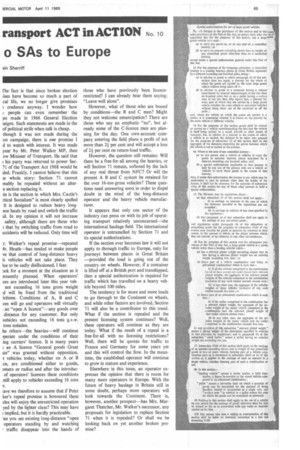ransport ACT in ACTION No 10
Page 67

If you've noticed an error in this article please click here to report it so we can fix it.
o SAs to Europe
sin Sherriff [he fact is that since broken election ises have become so much a part of cal life, we no longer give promises
credence anyway. I wonder how r people can even remember the r,es made in 1966 General Election }aigns. Such statements are made in the of political strife when talk is cheap. though it was not made during the on campaign, there is one promise I
d to watch with interest. It was made year by Mr. Peter Walker MP, then ow Minister of Transport. He said that i his party was returned to power Sec71 of the Transport Act 1968 would be ded. Frankly, I cannot believe that this le whole story: Section 71 cannot 'nobly be repealed without an alter e section replacing it.
is is the section in which Mrs. Castle's cheat Socialism" is most clearly spelled It is designed to reduce heavy longnee hauls by road and switch the traffic In my opinion it will not increase safety, although there are those who that by switching traffic from road to tccidents will be reduced. Only time will r. Walker's repeal promise—repeated 4r. Heath—has tended to make people ve that control of long-distance heavy Is vehicles will not take place. They lue to be sadly disillusioned, I fear.
3ok for a moment at the situation as it resently planned. When operators' ces are introduced later this year vehnot exceeding 16 tons gross weight :d will be freed from the traditional ictions. Conditions of A, B and C ces will go and operators will virtually an "open A licence"—any goods over distance for any customer. But only vehicles not exceeding 16 tons g.v.w. tons unladen.
he others—the heavies—will continue iperate under the conditions of their ing carriers' licence. It is many years .; an A licence "General goods Great tin" was granted without opposition. t vehicles today, whether on A or B Lee, are conditioned either to goods, miners or radius and after the introducof operators' licences these conditions still apply to vehicles exceeding 16 tons V.
Lave we therefore to assume that if Peter ker's repeal promise is honoured these cks will enjoy the unrestricted operation yed by the lighter class? This may have I implied, but it is hardly practicable.
an you see existing long-distance "open operators standing by and watching ' traffic disappear into the hands of those who have previously been licencerestricted? I can already hear them saying; "Leave well alone".
However, what of those who are bound by conditions—the B and C men? Might they not welcome emancipation? There are those who say an emphatic "no", but already some of the C-licence men are planning for the day. One own account company entering the field plans a profit of not more than 2+ per cent and will accept a loss of 2+ per cent on return-load traffic.
However, the question still remains: Will there be a free-for-all among the heavies, or will Section 71 remain, softened by the lack of any real threat from NFC? Or will the present A B and C system be retained for the over 16-ton-gross vehicles? These questions need answering soon in order to dispel doubt in the mind of the long-distance operator and the heavy vehicle manufacturer.
It appears that only one sector of the industry can press on with its job of operating transport relatively unconcerned—the international haulage field. The international operator is untramelled by Section 71 and its special authorizations.
If the section ever becomes law it will not apply to through traffic to Europe, only for journeys between places in Great Britain —provided the load is going out of the country on wheels. However, if a container is lifted off at a British port and transhipped, then a special authorization is required for traffic which has travelled on a heavy vehicle beyond 100 miles.
The tendency is for more and more loads to go through to the Continent on wheels, and while other factors are involved, Section 71 will also be a contributor to this trend. What if the section is repealed and the present licensing system continues? Well, these operators will continue as they are today. What if the result of a repeal is a free-for-all with no licensing restrictions? Well, there will be quotas for traffic to France and Germany for some years yet and this will control the flow. In the meantime, the established operator will continue to grow in stature and experience.
Elsewhere in this issue, an operator expresses the opinion that there is room for many more operators in Europe. With the future of heavy haulage in Britain still in some doubt, perhaps more operators will look towards the Continent. There is, however, another prospect—has Mrs. Margaret Thatcher, Mr. Walker's successor, any proposals for legislation to replace Section 71 when it is repealed? Or shall we be looking back on yet another broken promise?












































































































































